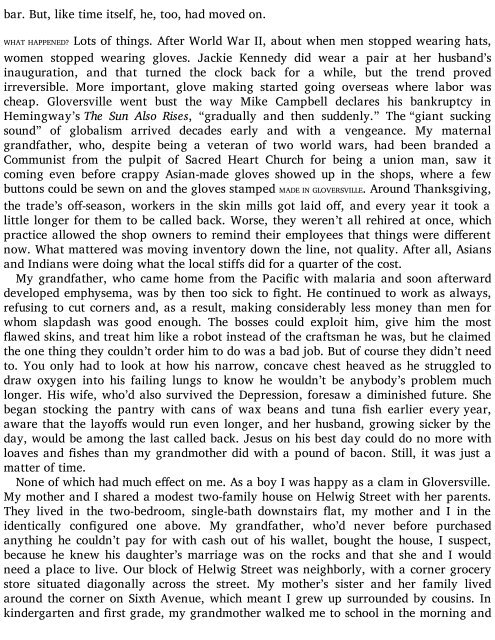8956825209375
You also want an ePaper? Increase the reach of your titles
YUMPU automatically turns print PDFs into web optimized ePapers that Google loves.
ar. But, like time itself, he, too, had moved on.<br />
WHAT HAPPENED? Lots of things. After World War II, about when men stopped wearing hats,<br />
women stopped wearing gloves. Jackie Kennedy did wear a pair at her husband’s<br />
inauguration, and that turned the clock back for a while, but the trend proved<br />
irreversible. More important, glove making started going overseas where labor was<br />
cheap. Gloversville went bust the way Mike Campbell declares his bankruptcy in<br />
Hemingway’s The Sun Also Rises, “gradually and then suddenly.” The “giant sucking<br />
sound” of globalism arrived decades early and with a vengeance. My maternal<br />
grandfather, who, despite being a veteran of two world wars, had been branded a<br />
Communist from the pulpit of Sacred Heart Church for being a union man, saw it<br />
coming even before crappy Asian-made gloves showed up in the shops, where a few<br />
buttons could be sewn on and the gloves stamped MADE IN GLOVERSVILLE. Around Thanksgiving,<br />
the trade’s o-season, workers in the skin mills got laid o, and every year it took a<br />
little longer for them to be called back. Worse, they weren’t all rehired at once, which<br />
practice allowed the shop owners to remind their employees that things were dierent<br />
now. What mattered was moving inventory down the line, not quality. After all, Asians<br />
and Indians were doing what the local stiffs did for a quarter of the cost.<br />
My grandfather, who came home from the Pacic with malaria and soon afterward<br />
developed emphysema, was by then too sick to ght. He continued to work as always,<br />
refusing to cut corners and, as a result, making considerably less money than men for<br />
whom slapdash was good enough. The bosses could exploit him, give him the most<br />
awed skins, and treat him like a robot instead of the craftsman he was, but he claimed<br />
the one thing they couldn’t order him to do was a bad job. But of course they didn’t need<br />
to. You only had to look at how his narrow, concave chest heaved as he struggled to<br />
draw oxygen into his failing lungs to know he wouldn’t be anybody’s problem much<br />
longer. His wife, who’d also survived the Depression, foresaw a diminished future. She<br />
began stocking the pantry with cans of wax beans and tuna sh earlier every year,<br />
aware that the layos would run even longer, and her husband, growing sicker by the<br />
day, would be among the last called back. Jesus on his best day could do no more with<br />
loaves and shes than my grandmother did with a pound of bacon. Still, it was just a<br />
matter of time.<br />
None of which had much eect on me. As a boy I was happy as a clam in Gloversville.<br />
My mother and I shared a modest two-family house on Helwig Street with her parents.<br />
They lived in the two-bedroom, single-bath downstairs at, my mother and I in the<br />
identically congured one above. My grandfather, who’d never before purchased<br />
anything he couldn’t pay for with cash out of his wallet, bought the house, I suspect,<br />
because he knew his daughter’s marriage was on the rocks and that she and I would<br />
need a place to live. Our block of Helwig Street was neighborly, with a corner grocery<br />
store situated diagonally across the street. My mother’s sister and her family lived<br />
around the corner on Sixth Avenue, which meant I grew up surrounded by cousins. In<br />
kindergarten and rst grade, my grandmother walked me to school in the morning and

















